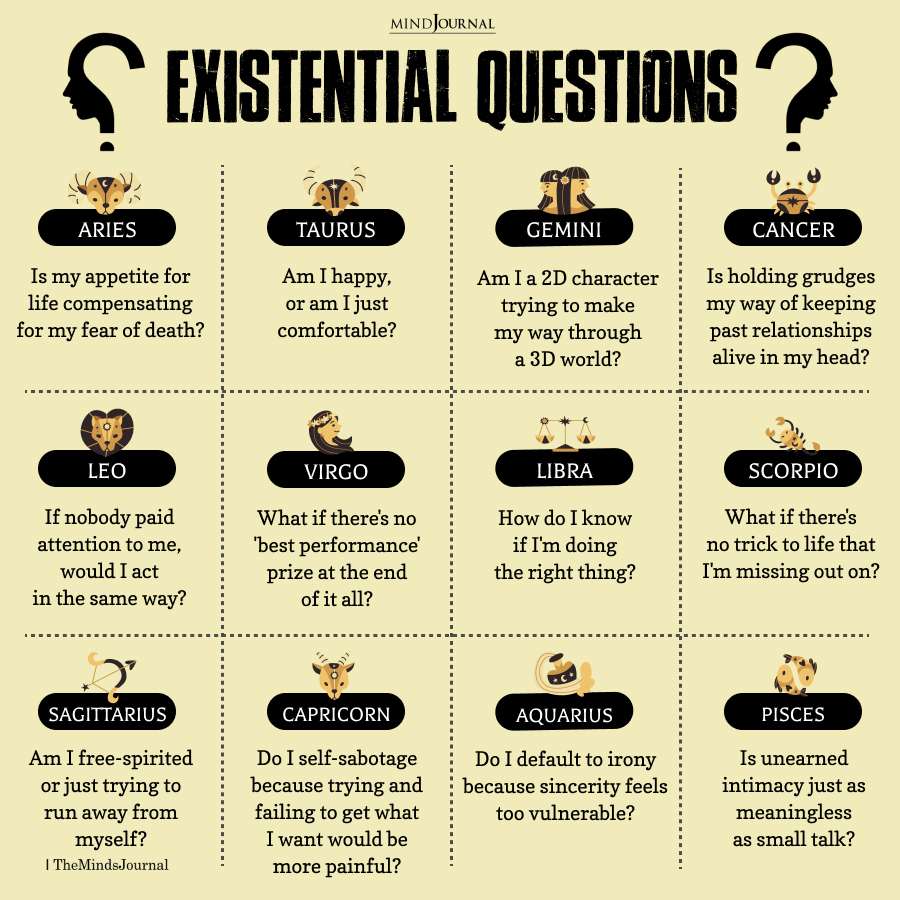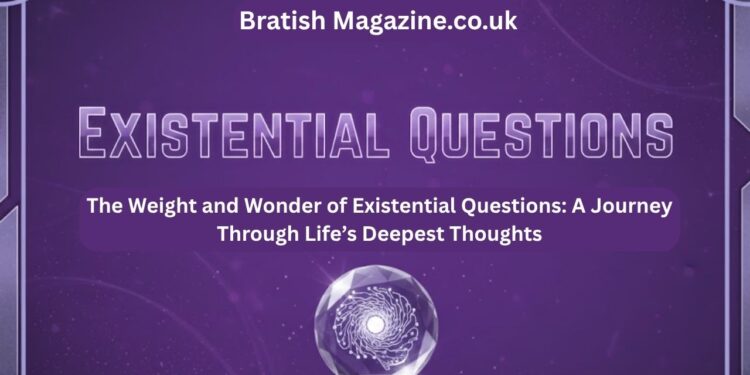Existential questions have fascinated humanity for as long as we’ve had the ability to think beyond our immediate needs. They are the big, open-ended questions that don’t come with a clear answer — questions like “Who am I?”, “What’s my purpose?”, and “Why does anything exist at all?” These are not just the musings of philosophers in old libraries; they’re questions that everyone, at some point, quietly wrestles with while staring at the ceiling at 2 AM.
In this article, we’ll unpack what existential questions really are, why they matter so much, and how they shape the way we live, love, and make sense of this strange, beautiful chaos we call life.
What Exactly Are Existential Questions?
At their core, existential questions are those that touch the essence of existence itself. They’re not concerned with how something works but rather why it exists in the first place. They challenge us to look at life from a perspective that goes far beyond daily routines and surface-level goals.
Think about it: science can tell you how stars are born, how the brain functions, and how evolution shaped us. But existential questions ask why any of that should matter. Why are we aware of our own existence? Why do we fear death? Why do we crave meaning in a universe that might be indifferent to us? These are not questions with clear-cut answers — and that’s exactly what makes them so powerful.
Interestingly, existential questions aren’t limited to philosophers or thinkers. Even a teenager wondering about the point of growing up, an artist searching for inspiration, or someone dealing with loss is engaging in existential inquiry. They may not call it “existentialism,” but it’s the same deep, restless curiosity about life and its meaning.
Why Humans Can’t Escape Existential Thinking

One of the unique traits that separates humans from other species is self-awareness. We don’t just live — we know that we live. And that awareness naturally leads us to question the why behind it all. From ancient cave paintings to modern art, literature, and film, Existential Questions themes have always been woven into the fabric of human expression.
When people face moments of change or crisis — like losing a loved one, switching careers, or even hitting a milestone birthday — existential thoughts bubble up. It’s as if our minds can’t help but zoom out and ask, “What’s the bigger picture here?” This instinct to search for meaning is what drives human creativity, spirituality, and even scientific discovery.
But there’s another layer to it. Existential questions also arise because life, by nature, is uncertain. We don’t get a manual when we’re born, and no one really knows what happens after death. That mystery can be terrifying, but it’s also strangely beautiful. The tension between not knowing and wanting to understand gives our lives depth. It’s what turns ordinary existence into a quest for purpose.
Common Existential Questions That Shape Our Lives
There are countless existential questions, but a few universal ones have followed humanity through every culture and generation. Each one opens a different window into the human condition.
Who Am I, Really?
This is perhaps the oldest existential question of all. Beneath our jobs, social roles, and personal identities lies a deeper inquiry: who am I when all the labels are stripped away? Many people spend their lives exploring this question — through travel, meditation, art, or simply introspection. The search for self isn’t just about finding answers but embracing the ongoing evolution of who we are becoming.
What Is My Purpose?
Another timeless question is about purpose — the need to believe that our lives matter. For some, purpose comes through relationships, careers, or passions. For others, it’s something spiritual or moral. But the truth is, purpose often shifts with time. What feels meaningful in your twenties might not resonate in your forties. The beauty lies in redefining your “why” as you grow, rather than clinging to a single, static idea of it.
Does Life Have Meaning — Or Do We Create It?
This one gets to the heart of existential philosophy. Is there an inherent meaning to existence, or is meaning something we invent to make sense of chaos? Thinkers like Jean-Paul Sartre and Albert Camus famously argued that life has no predetermined meaning — it’s up to each individual to create one. That idea can sound bleak at first, but it’s actually liberating. If life has no fixed purpose, then we are free to design our own.
The Beauty and Burden of Uncertainty
One of the hardest truths to accept about existential questions is that most of them don’t have definitive answers. You can’t Google “what is the meaning of life” and get a result that satisfies the soul. That uncertainty can feel heavy, especially in moments of doubt or loneliness. But paradoxically, it’s also what gives life its richness.
When you stop demanding certainty and start embracing curiosity, everything changes. Unanswered questions become invitations rather than obstacles. You begin to see life not as a puzzle to be solved but as an experience to be lived. That’s the heart of existential maturity — the ability to live comfortably in the unknown.
Even great minds like Kierkegaard and Nietzsche wrestled with this. They didn’t see the lack of clear answers as a problem, but as a fundamental part of being human. In a world that constantly pushes for clarity and control, learning to sit with ambiguity can be one of the most freeing things you’ll ever do.
How to Live With Existential Questions Without Losing Your Mind
It’s easy to get overwhelmed by big existential thoughts. After all, questioning the meaning of life can quickly spiral into an existential crisis if you’re not careful. But there are healthy ways to engage with these questions without falling into despair.
First, it helps to ground yourself in the present. Existential thoughts pull us into the infinite — the vast unknowns of time, death, and purpose. The antidote is mindfulness: focusing on the here and now, the simple act of being alive in this moment. You don’t have to figure out the whole universe; you just have to experience your corner of it fully.
Second, stay connected to others. Existential questions are deeply personal, but they’re also universal. Sharing your thoughts with friends, reading philosophy, or journaling can help you feel less isolated in your search. Many people find comfort in realizing that everyone — even the most confident or accomplished — grapples with these same questions.
Lastly, treat your existential curiosity as a source of creativity, not anxiety. Many great works of art, literature, and music were born from people wrestling with meaning. Channel that energy into something expressive — whether it’s writing, painting, or simply having deeper conversations. You may not find “the” answer, but you’ll create meaning along the way.
Why Existential Questions Make Life Worth Living
Here’s the twist: existential questions, though unsettling, are actually what make life meaningful. Without them, existence would be flat and mechanical. The very act of questioning gives life its shape and texture.
Every time you wonder about your purpose or the nature of reality, you’re participating in one of the oldest and most profound human traditions. You’re not lost — you’re exploring. You’re doing what every philosopher, poet, and dreamer before you has done: trying to make sense of being alive.
In that way, existential questions are not problems to be solved but companions to be embraced. They remind us that meaning isn’t handed to us — it’s built moment by moment, through our choices, passions, and connections.
Final Thoughts: The Ongoing Dance With the Unknown
At the end of the day, existential questions are less about finding definitive answers and more about deepening our understanding of life itself. They encourage humility, curiosity, and awe — qualities that make us more empathetic and alive.
You don’t need to be a philosopher to engage with existential questions. You just need to be human. Whether you’re pondering life during a quiet walk or having a deep 2 AM talk with a friend, you’re part of a timeless conversation — one that keeps evolving, just like you.
So, next time an existential thought sneaks in, don’t push it away. Smile at it. It’s just life reminding you that you’re aware, alive, and capable of wondering — and that’s a beautiful thing.


















































































